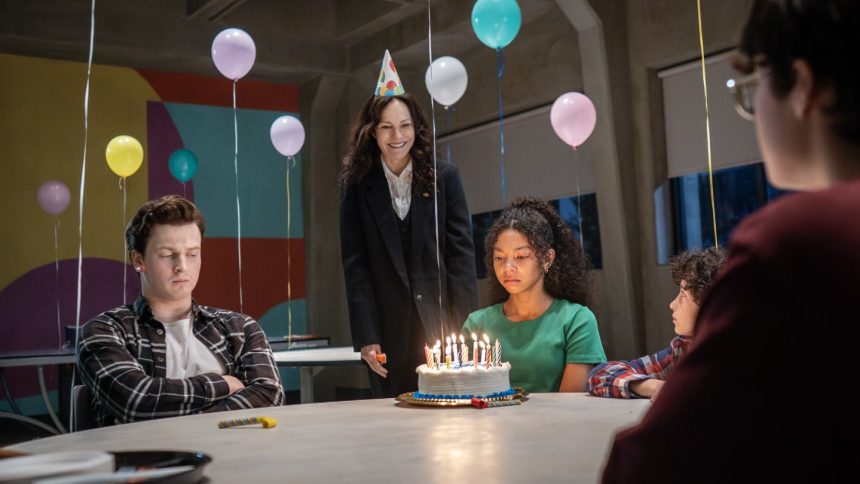‘The Institute’ Review: Mary-Louise Parker Leads MGM+’s Creepy but Forgettable Stephen King Adaptation
Stephen King’s 2019 novel The Institute is nearly 600 pages long, but it’s a wisp of a book — a throwback to the Ordinary Kids with Extraordinary Abilities subgenre that dominated the King of Horror’s earliest output. It’s wholly readable and ultimately forgettable, casting some modern insight onto the familiar plot but never quite emerging as anything distinctive or specific enough to rank anywhere near the author’s upper tier.
In that respect, MGM+‘s eight-episode television adaptation — working its way through the basics of the book’s plot, but leaving aspects unresolved for a hypothetical second season — delivers roughly what the source material deserves. It’s simple and polished and occasionally involving, but, like the book itself, it comes across more as a pu-pu platter of King tropes and archetypes rather than a fully developed or evolved spin on the formula.
The series hails from writer Benjamin Cavell, whose recent take on The Stand was so non-definitive that the pandemic thriller is already reportedly getting a new incarnation, and director Jack Bender, who worked on the underrated Mr. Mercedes. So it’s no surprise that The Institute is, if nothing else, generally on King’s wavelength. From the New England settings (played competently by Nova Scotia) to King’s love of repeated vernacular — get ready to roll your eyes at iterations of “night knocker” and “gork” and “shots for dots” — the series feels generally “right,” albeit disappointingly vague.
Despite the fidelity to King’s voice, this is the second consecutive adaptation that Cavell has begun by scrapping — and not necessarily for the best — King’s chosen narrative structure.
Here, we’re given two parallel storylines,
Tim Jamieson (Ben Barnes) is a former Boston police officer relieved of his duties under ripped-from-the-headlines circumstances. He finds himself in Dennison River Bend, Maine, working as a “night knocker” — a glorified patrolman and throwback to a quieter era of friendly community policing.
Meanwhile, in Minneapolis, 14-year-old genius Luke (Joe Freeman) is preparing to leave high school to start classes at MIT when he’s abducted and finds himself at the Institute, a concrete-encased facility just up the road from Dennison River Bend. Operating under the steely gaze of Ms. Sigsby (Mary-Louise Parker) and the withering watch of head of security Stackhouse (Julian Richings) and head of science Hendricks (Robert Joy), the Institute is a testing ground for kids with specific gifts.
In addition to being an intellectual prodigy, Luke has very low-grade telekinesis and he’s joining a special squad including friendly Kalisha (Simone Miller), rebellious Nick (Fionn Laird) and unusually powerful Avery (Viggo Hanvelt). Sigsby is overseeing a program of invasive medical tests, torture and interventions meant to enhance these kids’ latent powers, all for a nefarious purpose that, honestly, makes very little sense on either the page or screen.
Despite the insinuation that the fate of the world hinges on the conscripts and their combined clout, it all builds to… well, honestly it doesn’t build to much of anything.
In the book, King introduces Tim and his perfunctory backstory in the opening chapters; then the character disappears entirely for a long stretch that concentrates on the denizens of the Institute as they’re poked and prodded and abused, plotting an escape that will allow the storylines to intersect. For the series, Cavell has the Tim and Luke stories intercutting from the start. It’s a logical choice in that, other than Parker, Barnes is the show’s most recognizable star, but it’s illogical in that Tim is a really boring character. Barnes has obvious charisma, but he isn’t an inherently interesting actor; there are three or four episodes in which the stuff happening at the Institute is tense and intriguing, while Tim is walking a 2.3-mile loop, draining momentum every time he appears.
It’s not a momentum deficit the series can withstand, because The Institute is designed to be somewhat anticlimactic. King’s typical approach to the genre — gifted protagonists facing off against chilly government entities or insincere spiritual forces within a horror context — has fallen out of vogue in favor of comparable superhero origin stories with elevated skills and stakes. But The Institute is a muted indie film compared to various X-Men incarnations or The Umbrella Academy or Gen V or Supacell. The characters in The Institute have traces of telekinesis or telepathy, but in lieu of sequences driven by elaborate special effects, the drama comes from general child endangerment — not quite Squid Game using a baby as a prop, but still exhausting — and the unsettling performances by the adults in authoritarian roles.
Parker is chilly and weird perfection to the degree that we get to know Ms. Sigsby, which is limited even with the show handing her several eccentric self-flagellating traits that don’t really pay off. As good as she is, The Institute is more effective at wringing creepiness from Joy and Richings’ performances, or that of Jason Diaz, unnerving as the sole representative of the Institute’s secondary staff. But “creepy” is as far as Bender and his fellow directors ever get, never even approaching “terrifying” or “disturbing.”
To reach that visceral level, The Institute probably would have needed to follow the various topical breadcrumbs that Cavell has dropped here. Undercurrents evocative of family separation immigration policies and an epidemic of missing kids are acknowledged, but only briefly. More effective is The Institute positioning itself as an easily digestible version of The Zone of Interest, in which a monstrosity — one with chimneys that periodically billow ominous black smoke — exists right on the edge of a quietly banal community that suspects something horrible is happening, but lives in denial.
The Institute never achieves either emotional potency or any sense of gee-whiz spectacle. The Institute’s facilities are austere and a little stale, reflecting an underfunded government program and an underfunded television show in which the coolest visual element relates to the glowing red ear tag stapled to the kids upon their arrival. As for the young actors the tags adhere to, they’re generally fine, especially Freeman. But after eight hours, you never really feel like an ensemble has emerged, which is less than ideal if you crave investment beyond “They’re kids, so they probably shouldn’t be lab animals!”
When I mentioned MGM+’s The Institute to a colleague, after a pause he replied, “I think I read that one?” Expect a similarly unemphatic response to a series that never executes well enough to generate excitement, but at least never builds enough anticipation to disappoint.







